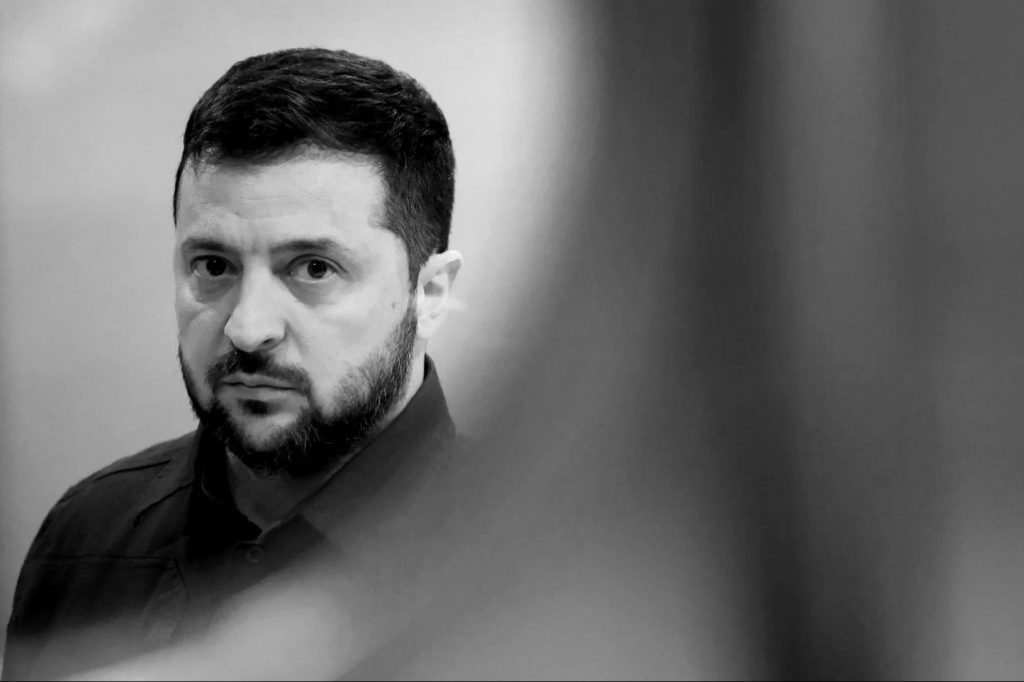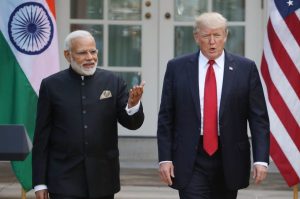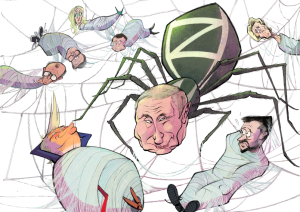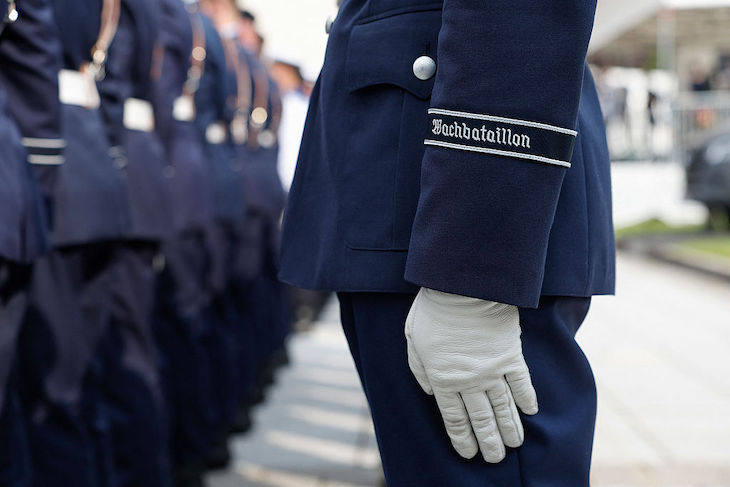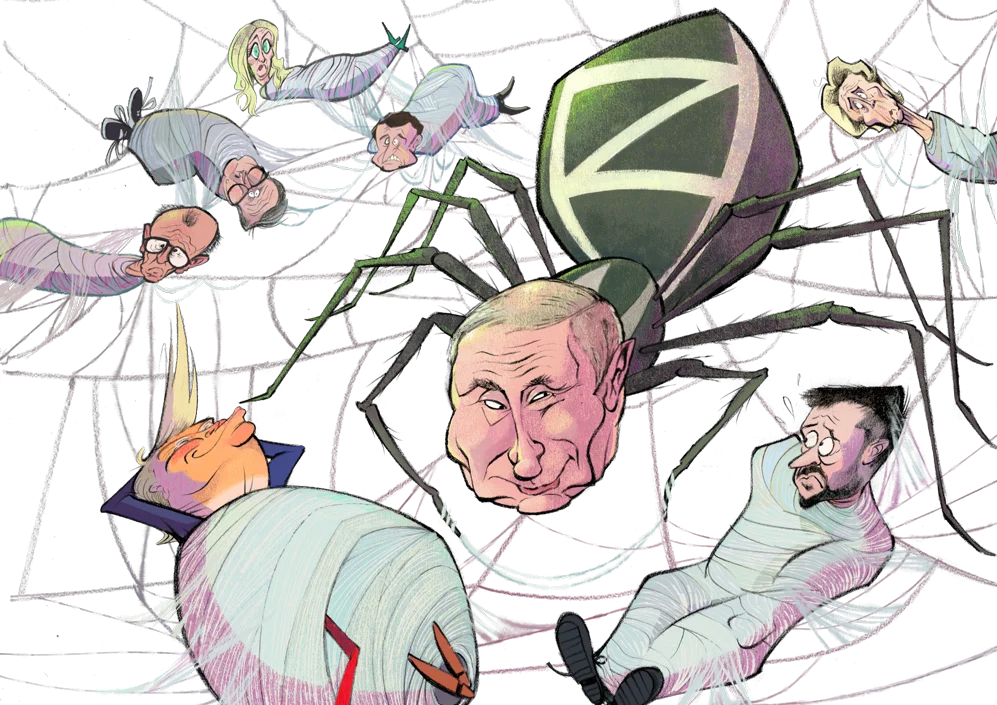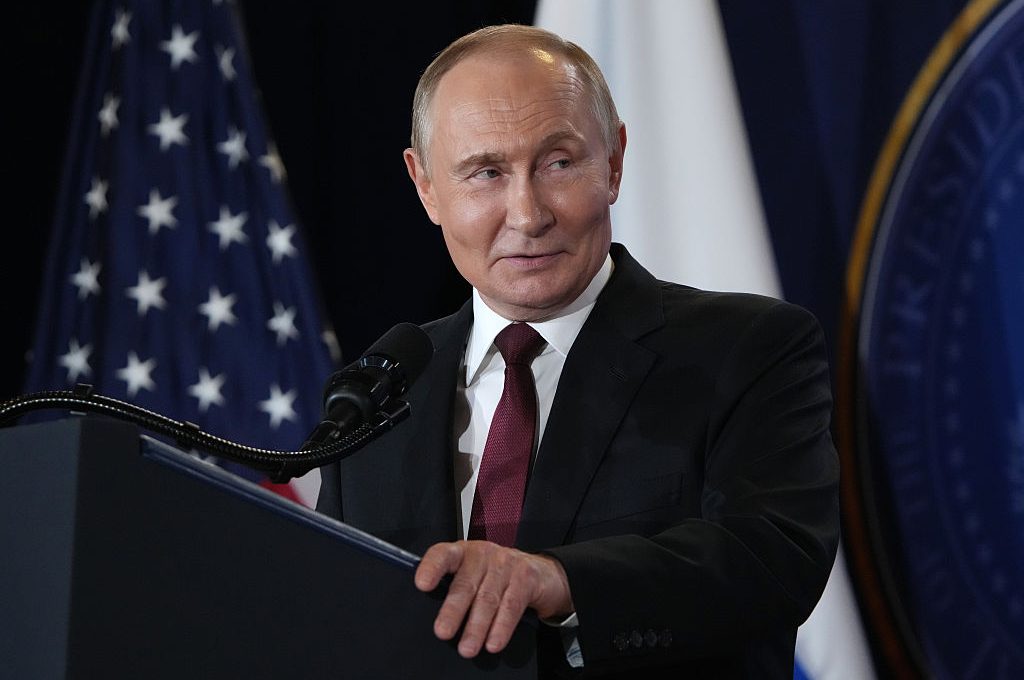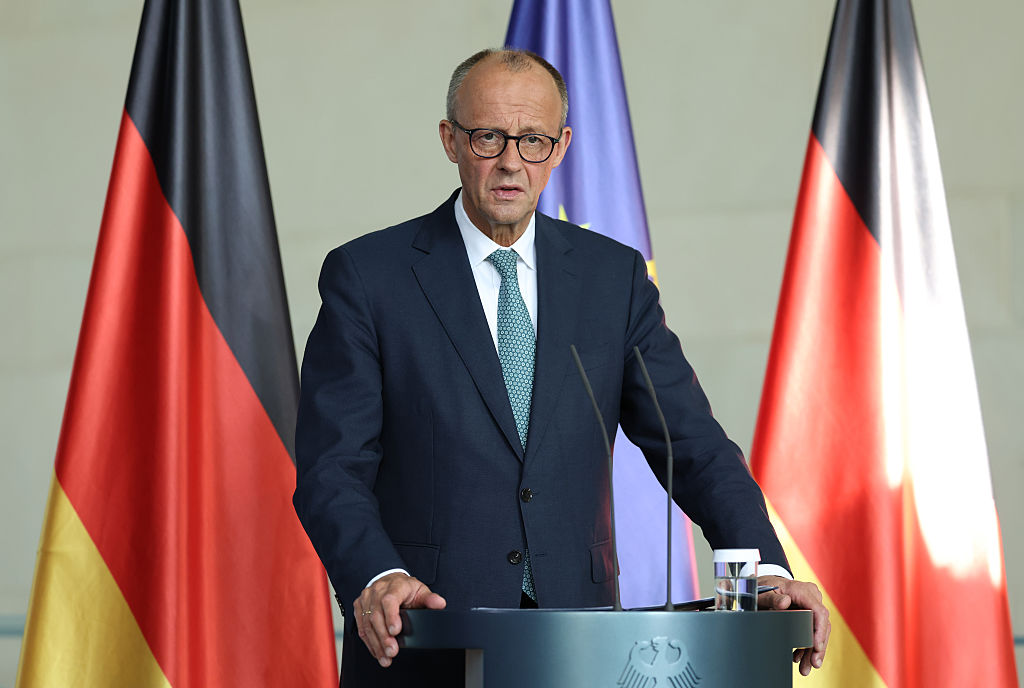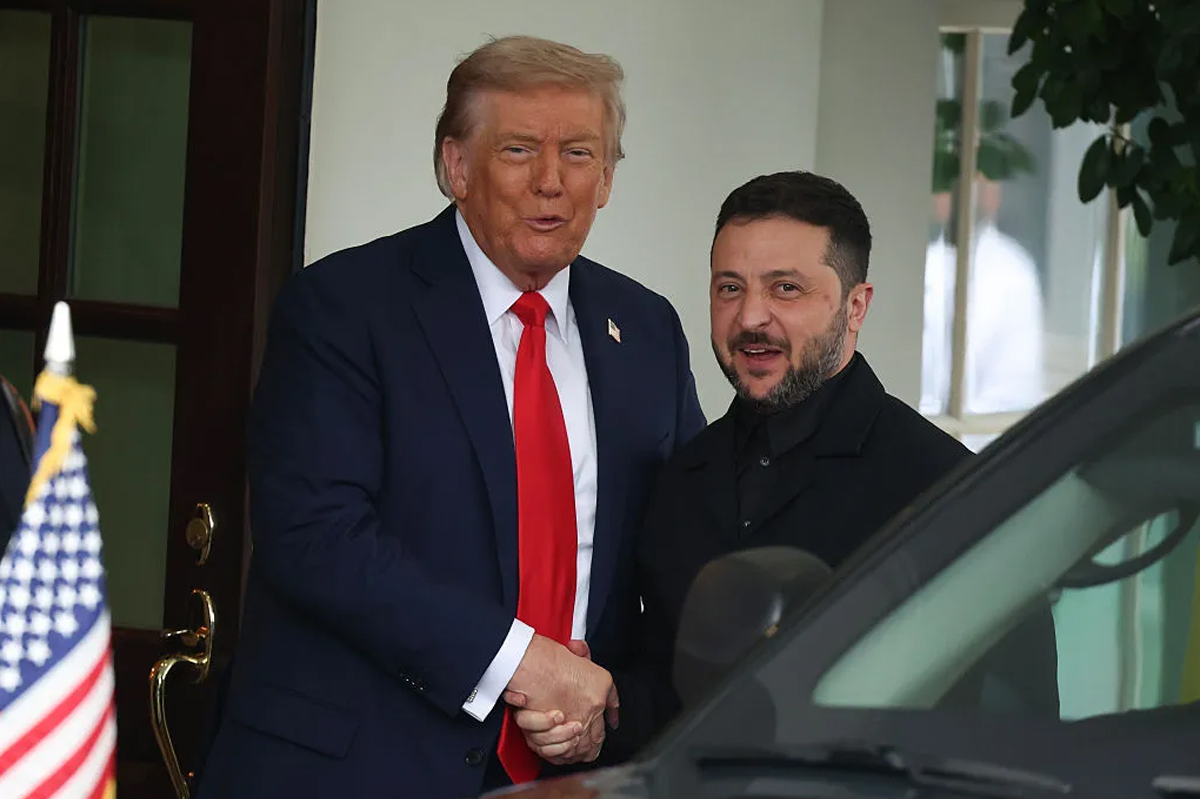Perhaps all political careers must end, inevitably, in failure. But few politicians have had careers as meteoric, as surprising, as consequential or as heroic as that of Ukrainian president Volodymyr Zelensky. In just five years he has gone from TV comedian to victor of the biggest presidential landslide in his country’s history to inspiring wartime leader who impressed the world with his resolve and personal bravery. But now with the war entering its third (and probably last) winter, Zelensky’s extraordinary story as Ukraine’s leader has reached its final chapter.
Voters blame Zelensky for the war’s failures — and do not wish him to play any part in their country’s future
After a thousand days of defiance, not only of Russian aggression but also of the grim reality on the ground, Zelensky last week finally admitted that the reconquest of the territories occupied by Russia could be abandoned in return for rapid NATO membership. Given that NATO membership is not, in fact, remotely on the cards, what Zelensky was really admitting was the inevitability of territorial loss as part of a Donald Trump-brokered negotiation with the Kremlin.
It will be up to future historians to assess, and for the people of Ukraine to debate, what Zelensky could have done differently to achieve a better outcome. But what is becoming abundantly clear is that, rightly or wrongly, Ukraine’s voters blame Zelensky for the war’s failures — and do not wish him to play any part in their country’s future.
Recent polls suggest that just 22 percent of Ukrainians would vote to re-elect Zelensky for a second term (with just 16 percent marking him as their first choice). According to a poll last month by the Social Monitoring Center in Kyiv, about 60 percent would prefer Zelensky not even to stand at all. Leading the polls is General Valerii Zaluzhny — whom Zelensky fired as chief of Ukraine’s general staff in February and effectively exiled as ambassador to London — whose support in presidential elections stands at 42 percent. Third in the race is Ukraine’s enigmatic and ruthless military intelligence chief, General Kyrylo Budanov, on 18 percent.
Formally, Zelensky’s five-year presidential term ended on May 20 this year. In practice, though, there will be no campaigning or voting while the war still rages. In the meantime, Zelensky and his team will continue ruling directly through wartime powers that bypass parliament and, crucially, suspended all non-state broadcast media.
Despite reporting restrictions, a steady drip of shocking stories about corruption has fueled anger among voters, with 70 percent convinced the government is profiteering from the war. Independent online journalists from the likes of Zerkalo Nedeli, Ukrainskaya Pravda and Nashi Groshi — a site devoted to tracking corruption in military procurement — have revealed local medical officials making millions from issuing fake medical certificates for draft dodgers, lucrative government procurement contracts going to cronies of senior ministers, and much more.
Last year, the defense minister Oleksiy Reznikov was eventually fired six months after revelations of massive overpayments for food and equipment for the army. Last month, the head of an agency tasked with building British-designed bunkers for Ukrainian electricity substations that would protect them from Russian attack resigned. He accused members of Zelensky’s government of deliberately blocking the release of funds and demanding kickbacks.
Another major source of public anger is the ongoing controversy over forced conscription. A severe shortage of manpower on the front lines has led Ukrainian military recruiters to take ever more violent measures to catch potential soldiers. Videos of these armed press-gangs appear daily on Ukrainian social media. Concerts and nightclubs are raided, with young men dragged kicking and screaming into vans. Strikingly, many of these videos feature bystanders either actively helping the draftees to escape or chanting: “Shame! Shame!”
Up to 80 percent of Ukraine’s energy infrastructure has been destroyed or damaged, as well as swaths of industrial facilities. The economy has collapsed, with GDP down 30 percent. Public finances have been on life-support since the beginning of the war. Piecemeal international donations — for instance, $6.1 billion in November — are paying for the lion’s share of the salaries of Ukraine’s teachers, doctors, nurses and government officials.
This year Zelensky’s cash-strapped government was forced to stop paying special benefits to millions of internally displaced people from the Russian-occupied east. As a result, thousands have voted with their feet and returned to their homes, most traveling via Moscow because of the closure of all land borders. Some 150,000 refugees have left, apparently preferring Russian rule to poverty and exile in Ukraine.
According to Petr Andriushchenko, an advisor to the Kyiv-appointed former mayor of the city, about a third of the population of Russian-occupied Mariupol, the port city that saw some of the heaviest fighting in spring 2022, have returned. Many Ukrainian regions are “unfriendly for internally displaced persons,” said Andriushchenko — especially as refugees from the east are overwhelmingly Russian-speaking, something that is increasingly not tolerated in many western parts of the country.
But it is the horrifying human toll of the war that remains the chief wellspring of discontent with Zelensky. Ukraine’s civilian and military casualties are a closely held state secret. But civil society groups such as Mediazona, Meduza, the Book of Memory and the UA Losses project have documented the deaths of some 60,435 Ukrainians, including civilians, by name as of November 6 this year. The full total is likely to be much higher. Zelensky’s latest domestic battle is to resist calls — including from the US — to lower the minimum age for conscription from the current twenty-five to eighteen. The logic is to save a young generation that is already tiny, to ensure the country’s future survival. To cave in on conscription of eighteen-year-olds at the eleventh hour of the war will only add to Zelensky’s deepening unpopularity.
As soon as an election date is announced there will be no shortage of blame to go around
One thing is in no doubt: as soon as an election date is announced, there will be no shortage of blame to go around. Many nationalist-minded Ukrainians will blame Zelensky for any compromise with Vladimir Putin. They will want to fight on. Conversely, other Ukrainians will blame Zelensky for not compromising with the Kremlin at the very beginning of the war. They will blame the West for supposedly forcing Ukraine to fight instead of taking a deal. That myth will be fueled by the fact that a final peace agreement is likely to resemble the “America First: Russia & Ukraine” plan drafted in April by General Keith Kellogg — now Trump’s pick as his Ukraine envoy. Kellogg’s plan involves freezing the front lines, effectively partitioning Ukraine along the line of control, without offering NATO membership to Kyiv.
That echoes the peace terms that Zelensky and Putin’s representatives discussed in Minsk, Antalya and Istanbul in March and April 2022. Those talks ultimately failed because the Kremlin team refused to budge on key additional demands such as limiting Ukraine’s armed forces and rewriting laws on language rights. Russia’s “plan was clear,” the former foreign minister Dmytro Kuleba told the Financial Times last week. “Neutralize Ukraine, stay where they are in Ukraine, demilitarize Ukraine. And then make the final shot.”
With opposition forces of every stripe starting to gear up for elections that could, technically, be as soon as May 25, it is clear that Zelensky will be catching most of the political flak. The final tragedy of his political career will be to sign off on the partition of a country he did so much to preserve and, later, to defend. But in many — in fact most — important ways, Zelensky is a victor. Four-fifths of Ukraine will emerge independent of Russian dominion, free to rebuild itself as a prosperous European democracy. But that will be the work of somebody else. If Ukraine is very lucky, it may find another leader of Zelensky’s strength and calibre.



